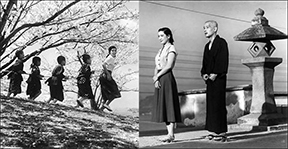 SATURDAY, SEPTEMBER 26, 2020
SATURDAY, SEPTEMBER 26, 202010AM – 5PM PT
FACULTY: FRANCIS G. LU, MD
6 Possible Continuing Education Credits Approved for MD, PhD, PsyD, MFT, LCSW, LPCC, LEP & RN
TUITION: $150 INCLUDES CEUs
FACULTY: FRANCIS G. LU, MD
6 Possible Continuing Education Credits Approved for MD, PhD, PsyD, MFT, LCSW, LPCC, LEP & RN
TUITION: $150 INCLUDES CEUs
At this time all classes will be online. As guidelines and requirements for meeting in public evolve and we are able to do so safely, we will let registrants know their options. This class online will have no maximum number of participants
IMAGE: © 1954 / Shochiku Ofuna Studio / Shochiku Co., Ltd. / Public domain
Two great Japanese actresses vividly embody anima qualities of compassion and wisdom in two great classic Japanese films from the 1950s as seen in this three-minute video tribute: http://youtube.com/watch?v=0O6tdZucyVc
Both “Twenty-Four Eyes” (1954, 2’ 36”, K. Kinoshita) and “Tokyo Story” (1953, 2’ 16”, Y. Ozu) employ transcendental style in film (Paul Schrader, 1972). Film clips will encourage participants’ contemplative, mindful viewing/processing to experience directly the anima qualities of compassion and wisdom from a distinctly Japanese aesthetic perspective rooted in Japanese Buddhism. Going beyond anima symbolized by the Virgin Mary and Sophia, these films reinforce the concept of anima as a universal archetype and not simply a Western one.
Based on C. G. Jung’s concept of anima as “the archetype of the feminine” and “the archetype of life,” James Hillman (1973) concluded that “anima development has thus become a major therapeutic tenet in the minds of many analytical psychologists.” Film viewing provides a way for anima development in that Beebe (1992) describes the anima in film as characters/actresses with “unusual radiance,” “unusual capacity for life or life force energy,” “a desire to make emotional connection as the main concern of the character,” and “who exert a protective and often therapeutic effect on someone else,” among other qualities.
Both “Twenty-Four Eyes” (1954, 2’ 36”, K. Kinoshita) and “Tokyo Story” (1953, 2’ 16”, Y. Ozu) employ transcendental style in film (Paul Schrader, 1972). Film clips will encourage participants’ contemplative, mindful viewing/processing to experience directly the anima qualities of compassion and wisdom from a distinctly Japanese aesthetic perspective rooted in Japanese Buddhism. Going beyond anima symbolized by the Virgin Mary and Sophia, these films reinforce the concept of anima as a universal archetype and not simply a Western one.
**Note: While it is not necessary for the participants to see the films before the seminar, they may do so if they wish. “Twenty-Four Eyes”: DVD Netflix, Criterion Channel. “Tokyo Story”: DVD Netflix, Criterion Channel, Amazon Prime Video, iTunes. Both are on DVD.**
FRANCIS G. LU, MD, is the Luke & Grace Kim Professor in Cultural Psychiatry, Emeritus, at University of California, Davis. As an American Psychiatric Association Distinguished Life Fellow, Dr. Lu has contributed to cultural psychiatry, psychiatric education, film and psychiatry, and psychiatry/religion/spirituality. Since 1987, he has led or co-led 36 film seminars at the Esalen Institute; 28 were with Brother David Steindl-Rast.
Date: Sep 26, 2020 10:00 AM - 05:00 PM
Fee
$150.00
CE Hours
6.00
Registration closes on Oct 31, 2021 01:00 AM
Activity Type
- Extended Education
Accreditation(s)

The C.G. Jung Institute of San Francisco is accredited by the California Medical Association to provide continuing medical education for physicians.
Clinical psychologists are also eligible to receive CME credit, which is accepted by the APA and the California Board of Psychology.
The C.G. Jung Institute of San Francisco designates this live activity for a maximum of 6.00 AMA PRA Category 1 Credit(s)™ Physicians should claim only the credit commensurate with the extent of their participation in the activity.
Requirements for CE Credit
Participants will receive credit following the completion of each post-test and evaluation, based on their actual attendance.
Support
Support/Credits
This presentation was NOT underwritten or supported by commercial entities. The faculty who selected, planned, and made this presentation confirm that they have received no paymets within the past year from for-profit companies that produce health care goods or services.
Registration Closed
Registration Closed
Speaker(s)/Author(s)
|
Francis Lu, MD Brief Bio : FRANCIS G. LU, MD, is the Luke & Grace Kim Professor in Cultural Psychiatry, Emeritus, at University of California, Davis. As an American Psychiatric Association Distinguished Life Fellow, Dr. Lu has contributed to cultural psychiatry, psychiatric education, film and psychiatry, and psychiatry/religion/spirituality. Since 1987, he has led or co-led 36 film seminars at the Esalen Institute; 28 were with Brother David Steindl-Rast. |
Date:
09/26/20
Time:
10:00 AM - 05:00 PM
CE Hours
6.00
Registration Closed
